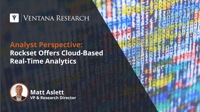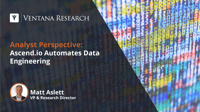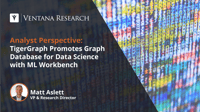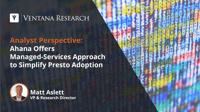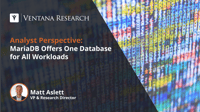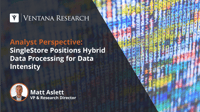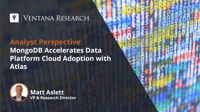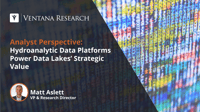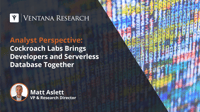I have written recently about increased demand for data-intensive applications infused with the results of analytic processes, such as personalization and artificial intelligence (AI)-driven recommendations. Almost one-quarter of respondents (22%) to Ventana Research’s Analytics and Data Benchmark Research are currently analyzing data in real time, with an additional 10% analyzing data every hour. There are multiple data platform approaches to delivering real-time data processing and analytics...
Read More
Topics:
Cloud Computing,
Data,
Streaming Analytics,
Analytics & Data,
Streaming Data & Events,
analytic data platforms,
operational data plaftforms
I have recently written about the importance of healthy data pipelines to ensure data is integrated and processed in the sequence required to generate business intelligence, and the need for data pipelines to be agile in the context of real-time data processing requirements. Data engineers, who are responsible for monitoring, managing and maintaining data pipelines, are under increasing pressure to deliver high-performance and flexible data integration and processing pipelines that are capable...
Read More
Topics:
Big Data,
Cloud Computing,
Data Management,
Data,
data operations
I recently wrote about the growing range of use cases for which NoSQL databases can be considered, given increased breadth and depth of functionality available from providers of the various non-relational data platforms. As I noted, one category of NoSQL databases — graph databases — are inherently suitable for use cases that rely on relationships, such as social media, fraud detection and recommendation engines, since the graph data model represents the entities and values and also the...
Read More
Topics:
business intelligence,
Analytics,
Cloud Computing,
Data,
Digital Technology,
AI & Machine Learning,
data platforms,
Analytics & Data
I previously described the concept of hydroanalytic data platforms, which combine the structured data processing and analytics acceleration capabilities associated with data warehousing with the low-cost and multi-structured data storage advantages of the data lake. One of the key enablers of this approach is interactive SQL query engine functionality, which facilitates the use of existing business intelligence (BI) and data science tools to analyze data in data lakes. Interactive SQL query...
Read More
Topics:
business intelligence,
Analytics,
Cloud Computing,
Data,
Digital Technology,
data lakes,
data operations,
AI & Machine Learning,
data platforms,
Analytics & Data
As I recently described, it is anticipated that the majority of database workloads will continue to be served by specialist data platforms targeting operational and analytic workloads, albeit with growing demand for hybrid data processing use-cases and functionality. Specialist operational and analytic data platforms have historically been the since preferred option, but there have always been general-purpose databases that could be used for both analytic and operational workloads, with tuning...
Read More
Topics:
Analytics,
Business Intelligence,
Cloud Computing,
Data,
Digital Technology,
data platforms,
Analytics & Data
I recently described the use cases driving interest in hybrid data processing capabilities that enable analysis of data in an operational data platform without impacting operational application performance or requiring data to be extracted to an external analytic data platform. Hybrid data processing functionality is becoming increasingly attractive to aid the development of intelligent applications infused with personalization and artificial intelligence-driven recommendations. These...
Read More
Topics:
Analytics,
Business Intelligence,
Cloud Computing,
Data,
Digital Technology,
AI & Machine Learning,
data platforms,
Analytics & Data
Over a decade ago, I coined the term NewSQL to describe the new breed of horizontally scalable, relational database products. The term was adopted by a variety of vendors that sought to combine the transactional consistency of the relational database model with elastic, cloud-native scalability. Many of the early NewSQL vendors struggled to gain traction, however, and were either acquired or ceased operations before they could make an impact in the crowded operational data platforms market....
Read More
Topics:
Business Continuity,
Cloud Computing,
Data,
Digital Technology,
digital business,
data platforms,
Analytics & Data
The need for data-driven decision-making requires organizations to transform not only the approach to business intelligence and data science but also accelerate the development of new operational applications that support greater business agility, enable cloud- and mobile-based consumption, and deliver more interactive and personalized experiences. To stay competitive, organizations need to prioritize the development of new, data-driven applications. As a result, many have been encouraged to...
Read More
Topics:
Analytics,
Cloud Computing,
AI & Machine Learning,
Analytics & Data
Data lakes have enormous potential as a source of business intelligence. However, many early adopters of data lakes have found that simply storing large amounts of data in a data lake environment is not enough to generate business intelligence from that data. Similarly, lakes and reservoirs have enormous potential as sources of energy. However, simply storing large amounts of water in a lake is not enough to generate energy from that water. A hydroelectric power station is required to harness...
Read More
Topics:
Analytics,
Business Intelligence,
Cloud Computing,
Data Governance,
Data Integration,
Data,
Digital Technology,
data lakes,
data operations,
AI & Machine Learning,
data platforms
Breaking into the database market as a new vendor is easier said than done given the dominance of the sector by established database and data management giants, as well as the cloud computing providers. We recently described the emergence of a new breed of distributed SQL database providers with products designed to address hybrid and multi-cloud data processing. These databases are architecturally and functionally differentiated from both the traditional relational incumbents (in terms of...
Read More
Topics:
Cloud Computing,
Data,
Digital Technology,
Digital transformation,
digital business,
data platforms,
Analytics & Data
